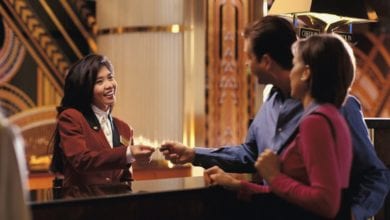Where should hospitality training begin and end?

Q: I received some ‘constructive’ feedback from a guest the other day, suggesting that I address my staff training better. It turned out the guest had a fear of spiders and asked a member of staff to remove one from their room; my employee didn’t use an ‘appropriate’ technique and the spider escaped. The guest was very nice, but it got me wondering, where should staff training begin and end?
A: I have to admit the full details of this story have given me the giggles. I am not much of a fan of spiders myself, but I can at least brave a glass to get rid of them. First off, I think perhaps this particular staff member does need a little bit of guidance on spider removal – attempting to flick it into a beer glass was never going to end well for the guest or the spider. Aside from that, you make a very interesting point about training.
Whether you secretly curse under your breath at the weird and wonderful guest requests or not, the threat of negative internet publicity means it has never been more true that ‘the customer is always right’. This means whether you like it or not, pest control is also your responsibility, not only in terms of legally required rat traps, but also in terms of the humane removal of spiders from guest bedrooms. There are not many hotels and hoteliers I know who have ‘spider management’ spelt out in their staff training handbook, and you would hope that your employees have the emotional intelligence to work out a good removal system for themselves, however if you don’t include things like this in your training, then you can’t blame your staff if it doesn’t go perfectly according to plan.
Trying to include every single possible outcome in the staff handbook is impossible – you’d waste millions of trees on the printing alone and would never be able to cover it all – but there are definitely more generic approaches you can take. When I ran my own hotel, my staff handbook included generic themes or sections that gave staff the understanding of my expectations as an employer and set out my desires for customer experience. The handbook itself was a blueprint that identified processes that can be applied to problems; however the problems themselves were omitted from the handbook. This approach ensured a proactive approach to problem solving, rather than a step-by-step following by rote.
In addition to the handbook, I ran regular monthly training sessions, talking about the weird and wonderful requests received from guests, and discussing the most appropriate ways of handling each situation. In the event a member of staff had handled it brilliantly, they were singled out for praise and given the opportunity to explain how they handled it and why they did it that way. These peer-to-peer learning sessions enabled staff to ask questions, understand expectations, continually learn and of course reaffirmed the importance of all round good customer care.
The second approach I took to staff training involved identifying four other hotels in the surrounding regions, which had a similar profile and price point. In the end, my ‘three counties’ training group met once a quarter, bringing all our staff together for training sessions and team building. The staff benefitted from learning from other employers, we were able to share best practice and odd requests and discuss how to tackle them; our standards went up across the board as a result. Even better, this hands-on briefing approach also helped our employees to understand the difference between ‘appropriate’ and ‘inappropriate’ requests, i.e. what guests requests they should be handling and which ones they should be turning down. Ultimately, this led to less complaints, and better handling of aggressive customers, drunk guests, and awkward encounters, such as a guest who has wet the bed.
For me, your handbook should be divided into themes, which detail the absolute musts of customer service, as well as providing clarity on practical processes and giving confidence to your employees. There should then be supporting training which keeps your staff fresh, challenges their thinking and clearly communicates expectations and application of procedures. As an employer, these sessions have the added bonus of increasing staff loyalty, as they feel valued and listened to, and will also foster a peer-to-peer positivity that should not be underestimated.
No, you don’t need to add spiders to your staff handbook, but yes, you should be equipping your staff to make informed, sensible decisions that help them go the extra mile.
This feature first appeared in the November 2016 issue of Hotel Owner.









